From 1888 to 2013: Celebrating the 125th Birthday of the First Aid Kit
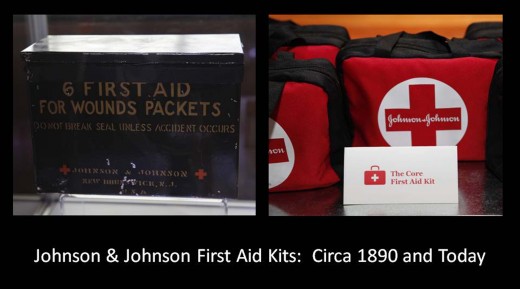
First Aid Kits are so central a part of modern life that it’s hard to imagine a time in which they didn’t exist. But before Johnson & Johnson began making the first commercial first aid kits in 1888, people were on their own when it came to gathering and maintaining the right supplies to use in treating injuries and in knowing how to help someone in case of an injury. A century and a quarter ago, that changed in a very social media-inspired way: through a conversation.
As this story from 1882 -- concerning our very own Fred Kilmer -- shows, when someone was injured before the era of first aid kits and first aid training, standard operating procedure was to have someone run as quickly as possible to fetch the nearest doctor – provided there was a doctor within fetching distance. Critical minutes and sometimes hours passed without treatment for the injured person, and many times bystanders did more harm than good while trying to move or help the man, woman or child who had been injured.
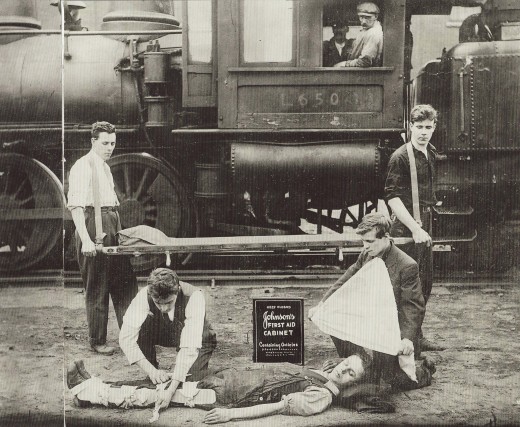
Railroad work in the 1800s was especially dangerous – so dangerous, in fact, that the railroads had surgeons to treat the often severe injuries to workers building the railroads and working on the steam locomotives. This site about the history of railroad surgeons has a good description of what conditions were like in the 1880s. Workers laying cross-country track were frequently injured and, working in the middle of nowhere, they were very far away from medical help. And here’s where the first of those conversations came in.
Sometime probably in the spring of 1888 (because the Company acted very quickly to make new ideas happen, and a letter in our archives to a railway surgeon is dated June of 1888), Johnson & Johnson founder Robert Wood Johnson was on a Colorado and Rio Grande Railroad train, travelling out west and looking forward to some much-needed vacation time at a Colorado cattle ranch.
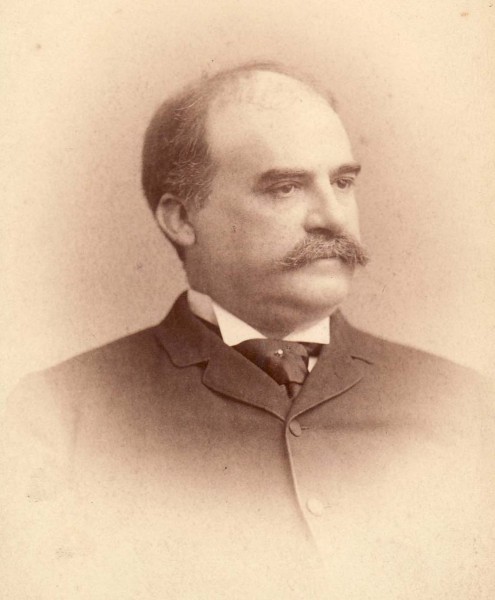
Being an outgoing person, Robert Wood Johnson started a conversation with a fellow passenger on the train: the chief surgeon of the Denver and Rio Grande Railway. The surgeon explained that the railroad workers laying track were frequently injured, but medical help was too far away to do any good. So Johnson had the idea to package some of the products Johnson & Johnson made – sterile gauze, bandages and dressings – in boxes. Those boxes could be kept with the workers so that, if they were injured, they could be treated and stabilized until they could reach more comprehensive medical help. Our 1888 price list explained the great need for first aid supplies: “It is a fact, which is everywhere being recognized, that many lives are lost and much suffering entailed in such accidents on account of the lack of the simple but necessary articles required to afford prompt assistance to the wounded.” [Johnson & Johnson Price List, September 1, 1888, p. 20. From our archives]

So in 1888 Johnson & Johnson wrote to railway surgeons, telling them that the Company was planning to make first aid kits, asking them what they needed in the kits. With their informed feedback, Johnson & Johnson put out the first commercial first aid kits in 1888: one for the railroads, and one general first aid kit.
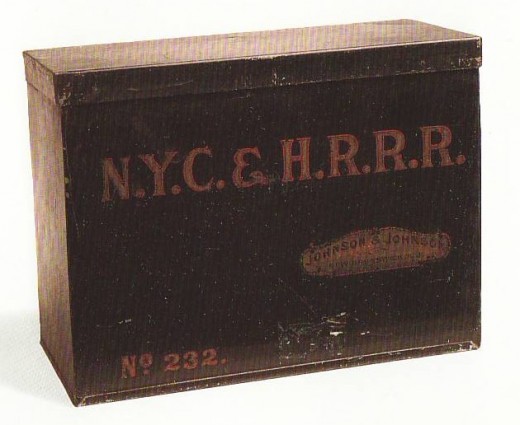
By 1890, we were making kits directly for the railroads (with the name of the railroad on the kit), and we began making them for the home, for travelers, for workplaces and public buildings and later, for automobiles and airplanes, and more. If there was a need, there was a Johnson & Johnson first aid kit to meet that need. After he joined the company in 1889, our Scientific Director Fred Kilmer researched first aid best practices, and we packaged his resulting first aid bulletins and then in 1901, the first First Aid manuals, with our kits.
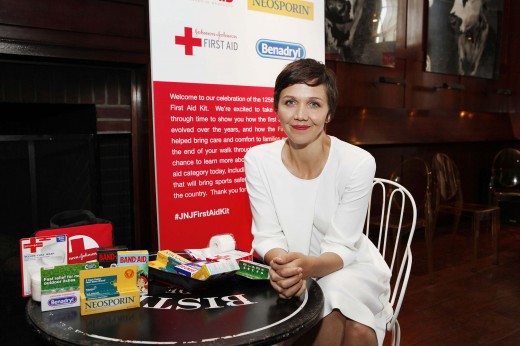
To commemorate this milestone anniversary, we held a June event in New York to celebrate the 125th birthday of the First Aid Kit. Actress and mom Maggie Gyllenhaal was on hand to help us celebrate, and she talked about growing up with many Johnson & Johnson Consumer Companies’ first aid products (including BAND-AID® Brand Adhesive Bandages!) and using them with her family.
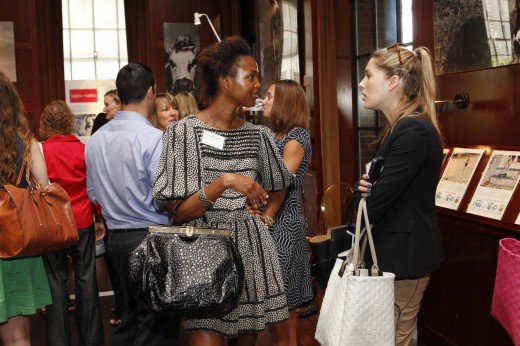
Safe Kids Worldwide was our partner in the event. Safe Kids was formed 25 years ago in 1988, with Johnson & Johnson as a founding sponsor. (In one of the many coincidences that run through Johnson & Johnson history, Safe Kids was formed in the 100th anniversary year of the First Aid Kit.) The mission of Safe Kids Worldwide is to prevent childhood injury across the world, and their work has led to an extraordinary 55 percent reduction in the unintentional injury rate among children 19 and younger. In a remarkable parallel to the First Aid Kit story, Safe Kids Worldwide was also founded based on a huge unmet need, and as the result of conversations that its founder, Dr. Marty Eichelberger of Children’s National Medical Center in Washington, D.C., had with a number of people (including people at Johnson & Johnson) about the need not just to treat, but to prevent the heartbreakingly high rates of preventable childhood injuries. (How huge is the need? According to data from Safe Kids Worldwide, around the world, a child dies from an unintentional injury every 30 seconds, and millions of children per year are injured in ways that can affect them for a lifetime.)
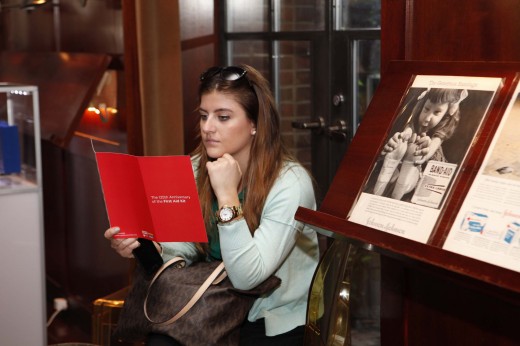
We set up a mini-museum at the event that included some rare and never-taken-out-in-public before historic First Aid Kits from our museum, along with vintage ads and stories from our archives about the history of the First Aid Kit.
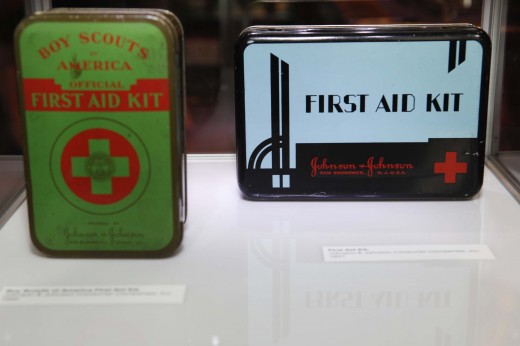
The exhibits showed just some of the variety of kits that were made for the railroads, the home, the workplace, for Boy Scouts and Girl Scouts, for airplanes, boating and even snake bites.
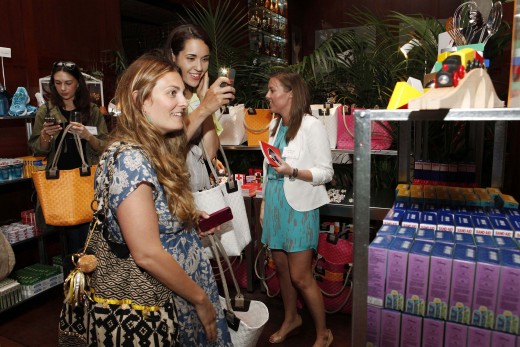
Today, that specialization has gone a level further, giving people the ability to customize their First Aid Kit for their family’s specific needs. And to celebrate the 125th anniversary of the First Aid Kit, when someone puts together a custom kit, our consumer company will make a donation to Safe Kids Worldwide to help prevent childhood injuries. So not only can you customize your First Aid Kit to the exact needs of your family, the donation it triggers will go to toward helping prevent injuries in the first place.
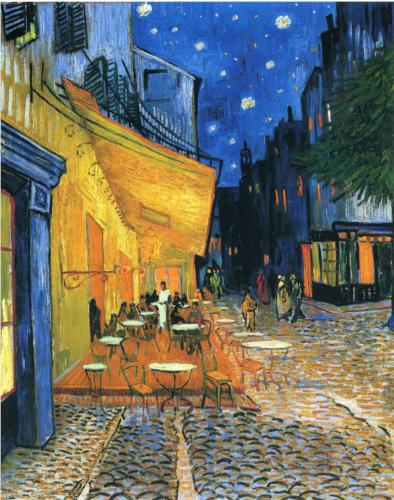
So how long ago was 1888? To put that century and a quarter into perspective, when Johnson & Johnson listed the first First Aid Kits in our 1888 price list, Vincent van Gogh was creating some of his most famous paintings, Queen Victoria reigned in the U.K., and the United States was made up of just 38 states instead of 50. Fast forward 125 years and the world is a very different place, but the First Aid Kits endures. Invented in a time in which there were few resources to treat the injured, when people still traveled by horse, stagecoach and steam locomotive, to today’s world of smartphones, search engines and social media, First Aid Kits remain as important and as necessary as ever. Finally, here’s a photo of that rare Johnson & Johnson Snake Bite First Aid Kit from 1964, one of the surprise hits of the mini-museum. Check out the very elegant and energetic Mad Men-era snake on the lid, and the way it wraps itself around the words “Snake Bite Kit.”
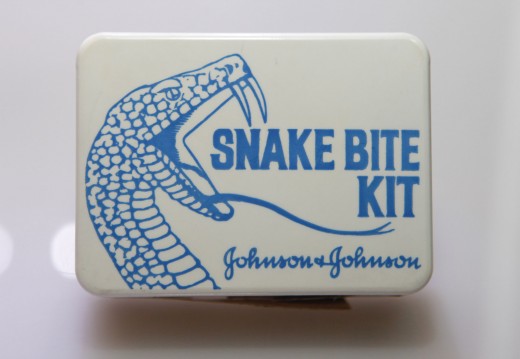

Super article!! I especially like your comparison of the 2 eras - 1888 and 2013 - 2 vey different worlds. It gives you a great perspective.
I always enjoy your articles, and when I think there's nothing else I can learn, I receive another interesting and educational article, and I continue learning about this company in which I have worled 40 years this year! thanks for my Continuing Education. Marcia
Thanks, Marcia! And congratulations on an amazing 40 years with the Company this year!
Margaret
Can you tell me anything more about the first picture in this article? We have a black metal "6 First Aid for Wounds Packets" container and are wondering what the age of it may be. This is the first time I have seen a photo of another like it! Thank you for the work you do for this website - the stories are fascinating!
In reply to by Suzy
Hi Suzy,
I'm glad you like the blog! You have one of the earliest commercial First Aid Kits. The small black metal kits marked "6 First Aid for Wounds Packets" are from circa the 1890s to the early 1900s, shortly after Johnson & Johnson introduced the first commercial First Aid Kits in 1888.
Best Regards,
Margaret
I have got to know...what makes the 1964 Johnson & Johnson Snake bite kit so rare?
In reply to by Tammy
Hi Tammy,
The snake bite kit is more rare because it's a much more specific First Aid Kit. Since many more people had the general use First Aid Kits in their homes and cars, more of those kits have survived since they were more common. Also, the snake bite kit has a plastic case, which is a bit more fragile than the older metal tins -- another reason there are fewer of them.
Margaret
Dear Ms Gurowitz,
I'm putting keyboard to comment box just to say how much I enjoyed reading your compilation of interesting company facts. J&J is indeed a remarkable company. Thanks!
Francis (Lugano, CH)
Hi - can you please tell me when the initial boy scout first aid kit was made? I'm going nuts trying to find that information. Please don't let me go nuts. :)
Thanks so much.
Terry
In reply to by terry quinn
Hi Terry,
The earliest Johnson & Johnson Boy Scout First Aid Packet that we have in our archives was made in 1925.
Margaret
Hi, I am trying to find out the history behind a green metal first aid box it is 57cm Length, 56cm height and 40cm wide. It has wood on the inside of the lid, a metal bar that slides across the front through two latches and metal handles. On the front is printed emergency first aid chest 805. Any information on it would be nice.
In reply to Hi, I am trying to find out… by Anonymous
Hi Betty,
Thanks for reaching out! Without pictures of your first aid kit, it's hard to provide any information about it. If you send some images through the blog's mailbox ([email protected]) I will take a look!